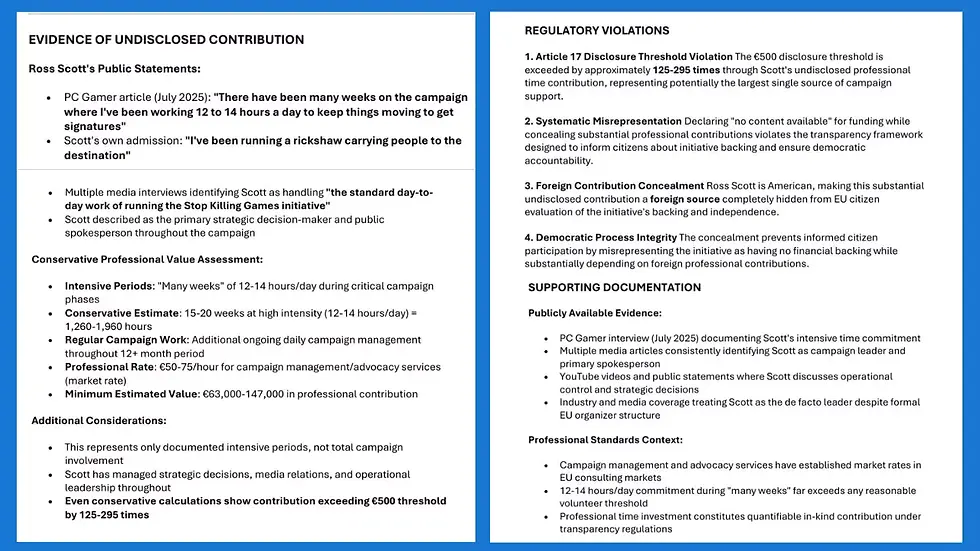Stop Killing Games Faces EU Complaint Over Transparency — Ross Scott Calls Allegations “Clown Accounting”
- Sagar Mankar

- Jul 23, 2025
- 4 min read

The Stop Killing Games campaign, which recently surpassed 1.4 million signatures and moved closer to European Commission review, is now facing a fresh challenge: an anonymous complaint accusing the movement of violating EU transparency laws.
At the center of the controversy is Ross Scott, creator of the broader campaign, who says the allegations are baseless and potentially part of a coordinated industry pushback.
According to the complaint, Scott allegedly provided undeclared “professional services” to the Stop Destroying Video Games Initiative, the official title of the European Citizens' Initiative (ECI) tied to the Stop Killing Games campaign. It accuses him of contributing the equivalent of €63,000 to €147,000 worth of labor — a figure calculated using inflated hourly rates and speculative time logs based on PC gamer articles.
Scott, however, firmly denies the accusations. In a video statement, he clarified that while he’s been one of the most vocal promoters of the initiative, he’s not an official member and is legally ineligible to join due to citizenship requirements. His work has been strictly voluntary, and according to EU regulations, individual volunteers offering unpaid help do not need to be reported as financial contributors.
“This is a very serious accusation,” Scott said. “But we’ve been following the rules. The EU itself confirmed that unpaid volunteer work from individuals doesn’t trigger reporting requirements.”
He also revealed that the initiative’s organizers had proactively consulted with EU officials back in early 2024 to ensure his involvement wouldn’t violate any regulations — and were told there was no issue.
To understand the legal backdrop, the complaint hinges on Article 17 of the ECI Regulation, which requires initiatives to declare all major donations or “in-kind” contributions over €500 — even if they are services rather than money. However, EU rules do not count unpaid, individual volunteer efforts (like what Ross has been doing) as reportable contributions. The initiative’s organizers followed these guidelines.
The complaint calculates Scott's time, labor, and public involvement — assigning a monetary value to it based on market consulting fees (€50-75/hour). Scott, however, dismissed the claims outright, calling them “clown accounting” and a deliberate attempt to derail the campaign. “They're saying my volunteer work is worth that much,” he said. “That low-end €63,000 is more money than I've made in any year in my entire life.”
He also explained that the initiative’s legal team consulted the EU in 2024 and confirmed that his role did not require reporting. “We already ran this by the EU,” Scott said. “It’s not just our opinion — it’s something the EU itself confirmed.”
Scott further emphasized, “I am not, nor have I ever been, a member of the initiative. I am not allowed to be, and I have never provided them with money or professional services. I’ve simply supported their cause as a private individual.”
While the complaint called him a “strategic decision-maker and public spokesperson,” citing his hours of unpaid work and visibility in media, Scott fired back: “I'm not getting paid. I’m just trying to help preserve games — and now someone’s saying I should be listed like I’m a corporate donor? Give me a break.”

Scott believes the complaint isn’t just some random misunderstanding. “This is a shot across the bow,” he said, suggesting a possible connection between the anonymous attack and recent opposition from Video Games Europe, an industry lobby group. “Someone was trying to kill the initiative — filing paperwork to the European Union, accusing the initiative and myself of violating the rules. That’s no small thing.”
He emphasized that the initiative has been “doing this by the book,” and the latest attacks appear more like smear tactics aimed at derailing public support. “This is the industry playing dirty now. It reminds me of Battleship. They took a shot hoping my battleship was here when it was actually here. So, they missed, but I sure felt the splash.”
Despite the pressure, support for Stop Killing Games remains strong. European Parliament Vice President Nicolae Ștefănuță continues to publicly back the initiative, as do several other MEPs. Scott urged supporters to stay engaged and not lose sight of the bigger issue. “The whole point of their accusations is to make you forget the real issue — which is consumers are getting robbed by the industry,” he said.
He also warned that more attacks may follow. “This has me a little worried... maybe in the future, I'm not at liberty to give commentary or defend myself like this,” he said, noting that future attempts to discredit the movement could escalate.
But for now, Scott remains focused on the mission: “When you buy a copy of a game, you should get to keep it. Publishers shouldn’t be able to destroy what you already paid for. This concept is so basic, it's still a joke we even have to fight for this.”
As of now, the European Commission has only acknowledged the complaint and has not launched a formal investigation. With Scott’s rebuttal and the existing EU transparency rules appearing to support his position, the campaign may be able to weather this storm. But it’s becoming increasingly clear that the industry isn't going to let the Stop Killing Games initiative move forward without resistance.







Comments